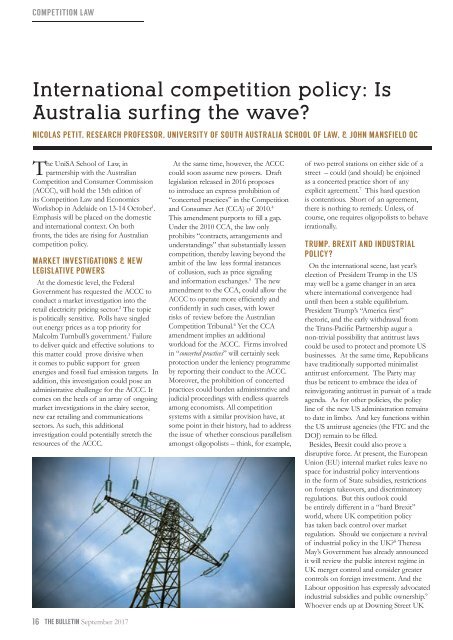LSB September 2017
You also want an ePaper? Increase the reach of your titles
YUMPU automatically turns print PDFs into web optimized ePapers that Google loves.
COMPETITION LAW<br />
International competition policy: Is<br />
Australia surfing the wave?<br />
NICOLAS PETIT, RESEARCH PROFESSOR, UNIVERSITY OF SOUTH AUSTRALIA SCHOOL OF LAW, & JOHN MANSFIELD QC<br />
The UniSA School of Law, in<br />
partnership with the Australian<br />
Competition and Consumer Commission<br />
(ACCC), will hold the 15th edition of<br />
its Competition Law and Economics<br />
Workshop in Adelaide on 13-14 October 1 .<br />
Emphasis will be placed on the domestic<br />
and international context. On both<br />
fronts, the tides are rising for Australian<br />
competition policy.<br />
MARKET INVESTIGATIONS & NEW<br />
LEGISLATIVE POWERS<br />
At the domestic level, the Federal<br />
Government has requested the ACCC to<br />
conduct a market investigation into the<br />
retail electricity pricing sector. 2 The topic<br />
is politically sensitive. Polls have singled<br />
out energy prices as a top priority for<br />
Malcolm Turnbull’s government. 3 Failure<br />
to deliver quick and effective solutions to<br />
this matter could prove divisive when<br />
it comes to public support for green<br />
energies and fossil fuel emission targets. In<br />
addition, this investigation could pose an<br />
administrative challenge for the ACCC. It<br />
comes on the heels of an array of ongoing<br />
market investigations in the dairy sector,<br />
new car retailing and communications<br />
sectors. As such, this additional<br />
investigation could potentially stretch the<br />
resources of the ACCC.<br />
16<br />
THE BULLETIN <strong>September</strong> <strong>2017</strong><br />
At the same time, however, the ACCC<br />
could soon assume new powers. Draft<br />
legislation released in 2016 proposes<br />
to introduce an express prohibition of<br />
“concerted practices” in the Competition<br />
and Consumer Act (CCA) of 2010. 4<br />
This amendment purports to fill a gap.<br />
Under the 2010 CCA, the law only<br />
prohibits “contracts, arrangements and<br />
understandings” that substantially lessen<br />
competition, thereby leaving beyond the<br />
ambit of the law less formal instances<br />
of collusion, such as price signaling<br />
and information exchanges. 5 The new<br />
amendment to the CCA, could allow the<br />
ACCC to operate more efficiently and<br />
confidently in such cases, with lower<br />
risks of review before the Australian<br />
Competition Tribunal. 6 Yet the CCA<br />
amendment implies an additional<br />
workload for the ACCC. Firms involved<br />
in “concerted practices” will certainly seek<br />
protection under the leniency programme<br />
by reporting their conduct to the ACCC.<br />
Moreover, the prohibition of concerted<br />
practices could burden administrative and<br />
judicial proceedings with endless quarrels<br />
among economists. All competition<br />
systems with a similar provision have, at<br />
some point in their history, had to address<br />
the issue of whether conscious parallelism<br />
amongst oligopolists – think, for example,<br />
of two petrol stations on either side of a<br />
street – could (and should) be enjoined<br />
as a concerted practice short of any<br />
explicit agreement. 7 This hard question<br />
is contentious. Short of an agreement,<br />
there is nothing to remedy. Unless, of<br />
course, one requires oligopolists to behave<br />
irrationally.<br />
TRUMP, BREXIT AND INDUSTRIAL<br />
POLICY?<br />
On the international scene, last year’s<br />
election of President Trump in the US<br />
may well be a game changer in an area<br />
where international convergence had<br />
until then been a stable equilibrium.<br />
President Trump’s “America first”<br />
rhetoric, and the early withdrawal from<br />
the Trans-Pacific Partnership augur a<br />
non-trivial possibility that antitrust laws<br />
could be used to protect and promote US<br />
businesses. At the same time, Republicans<br />
have traditionally supported minimalist<br />
antitrust enforcement. The Party may<br />
thus be reticent to embrace the idea of<br />
reinvigorating antitrust in pursuit of a trade<br />
agenda. As for other policies, the policy<br />
line of the new US administration remains<br />
to date in limbo. And key functions within<br />
the US antitrust agencies (the FTC and the<br />
DOJ) remain to be filled.<br />
Besides, Brexit could also prove a<br />
disruptive force. At present, the European<br />
Union (EU) internal market rules leave no<br />
space for industrial policy interventions<br />
in the form of State subsidies, restrictions<br />
on foreign takeovers, and discriminatory<br />
regulations. But this outlook could<br />
be entirely different in a “hard Brexit”<br />
world, where UK competition policy<br />
has taken back control over market<br />
regulation. Should we conjecture a revival<br />
of industrial policy in the UK? 8 Theresa<br />
May’s Government has already announced<br />
it will review the public interest regime in<br />
UK merger control and consider greater<br />
controls on foreign investment. And the<br />
Labour opposition has expressly advocated<br />
industrial subsidies and public ownership. 9<br />
Whoever ends up at Downing Street UK


















